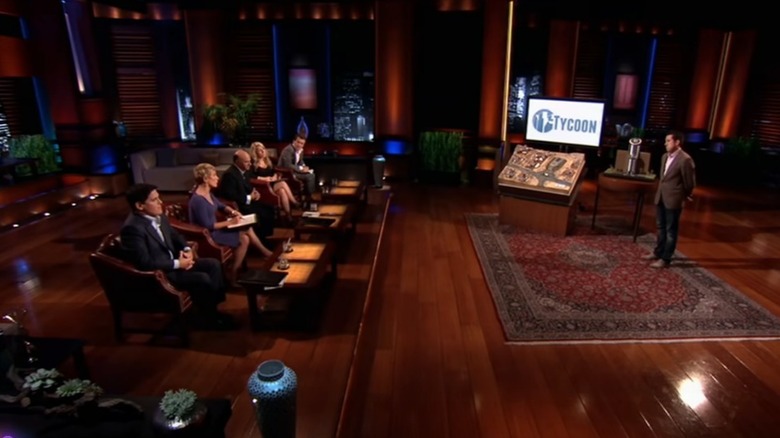What Happened To The Tycoon App From Shark Tank Season 6?
Since the hit investor pitch show "Shark Tank" premiered in 2009, the range of products and services presented to the Sharks have varied from new and innovative to downright scams. One area that has seen a wide range of pitches is real estate startups (an industry that's not afraid to embrace new tech like ChatGPT). While there have been many successes in this area, there have been more than a few failures, like fellow "Shark Tank" pitcher, Toor. Tycoon Real Estate, a crowdfunding platform from former AT&T executive Aaron McDaniel, was not your typical real estate business, though.
Several Sharks, including investor and entrepreneur Mark Cuban (who is exiting the show after season 16), quickly called the app a scam with no potential for success. Tycoon's business would allow anyone to invest small amounts of money in real estate with the potential for large returns. In return, Tycoon would take a 1.25% commission on funds raised. McDaniel was seeking $50,000 for a 5% stake in the company. One Shark –- Kevin O'Leary –- did offer the $50,000 for 50% of the company, so while there was some potential, the business didn't end up with funding from the Sharks.
Sharks slam Tycoon despite some positive reception
For as little as $1,000, one could invest in real estate using the app. While the site was simple to use and promised smaller investors potential returns, Mark Cuban hated it immediately and dropped out, saying it didn't offer protection for investors. The next to drop out of the deal was Shark Robert Herjavec. Herjavec indicated that people's life savings would be at risk. Sharks Lori Greiner and Barbara Corcoran dropped out for similar reasons. That left Kevin O'Leary, who despite arguing that the concept was not yet proven, made an offer that would require McDaniel to give up half the company, which didn't appeal to him so he declined.
Aside from the potential returns from investing in real estate in general, a key development helped springboard McDaniel's idea. He started the company after passage of the JOBS Act, which allowed non-accredited investors to invest in startups using crowdfunding platforms. That wasn't enough to convince the Sharks, however.
Founder cashes in on sale of company
Despite a lack of investment from the Sharks, McDaniel cashed in when he sold the company to a Chicago-based consortium of crowdfunding platforms (terms undisclosed). The platforms include American Homeowner Preservation, Patch of Land, Peer Realty, CrowdFranchise, and EquityRoots, all of which aim to make investing in real estate simple. Since the show, McDaniel began teaching at UC Berkeley's Haas School of Business and is a managing partner at startup consulting firm Global Class. He's also chairman of the board at non-profit youth community service organization Create The Change. The Tycoon website is no longer active.
McDaniel's efforts have increased the attention on real estate crowdfunding apps and inspired him to teach future entrepreneurs. The potential to prove the Sharks wrong is seen with the large number of real estate crowdfunding services launching since the appearance. Many companies on "Shark Tank" benefit from the publicity they gain even without a deal from the show, and McDaniel is no exception.

